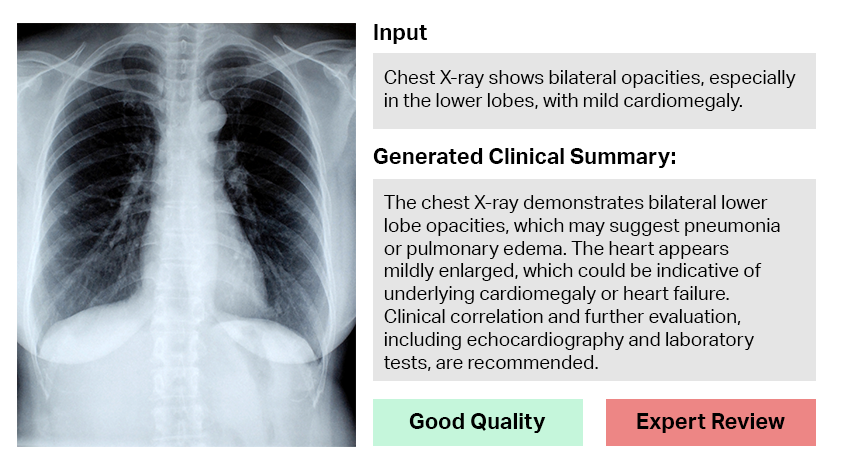Supervised Fine-Tuning a
Vision-Language Model for
Clinical Report Generation
A global healthcare technology company partnered with iMerit to apply supervised fine-tuning (SFT) to a vision-language transformer model designed for generating clinically accurate reports from radiologic images. The objective was to improve model output reliability using expert-reviewed and scored medical data.
Challenge
The client aimed to train a generative AI model that could evaluate and generate clinical summaries from radiology scans.
However, ensuring clinical accuracy, reducing variation in output quality, and maintaining consistency across multiple specialties posed significant challenges, particularly without access to domain-specific, high-quality training data suitable for supervised fine-tuning.

Solution
Three Key Components were combined to create a custom SFT solution for fine-tuning Clinical report generation
- Task and Workflow Customization: platform enables task design, quality control routing, and process automation.
- Expert Sourcing: Clinical specialists from iMerit’s team of radiologists were selected based on scope of practice, credentials, and task aptitude.
- Scoring Rubric: Reports were evaluated and rated based on custom criteria developed with iMerit’s data science, domain expert, and solutions teams.
- Secure Cloud Based Platform: Data, metadata, and expert contributors were coordinated using iMerit’s Ango platform while meeting the security requirements of healthcare including HIPAA.
iMerit assembled a specialized team of radiologists from a pool of over 400 experts, selected based on their subspecialty and domain expertise. Each radiologist was presented with multiple reports per case—one generated by the AI model and one standard report. They were tasked with evaluating and scoring the reports for clinical accuracy and coherence.
To scale this supervised fine-tuning workflow, iMerit developed a custom data pipeline with workflow routing, model integration, quality control analytics, and a multimodal review interface.
Feedback loops and evaluator consensus were used to refine annotations continuously, ultimately improving the model’s ability to generate accurate outputs.
This workflow was optimized to reduce manual overhead and enabled radiologists to focus on high-value assessments, refining the labeled dataset used for model fine-tuning.

Result
Through expert-to-expert dialogue and arbitration , iMerit helped the client achieve over 90%.
consensus among medical reviewers. The supervised fine-tuning process significantly improved the model’s ability to generate context-aware and clinically accurate reports. The refined outputs were later deployed in production, marking a key milestone in the client’s advancement in clinical AI.

“What I valued most about working with iMerit is their expert consultation during the early experimental phases of the project. It gave us the ability to work out all the bugs before we scaled.”
